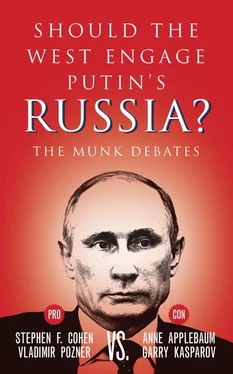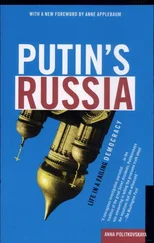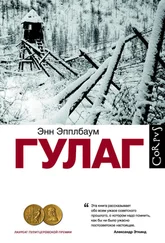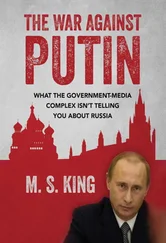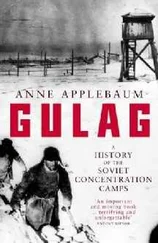Second is something that really worries me: during the last Cold War, over forty years ago, the great powers developed a series of rules of conduct — hot phones, hotlines, constant discussion, meetings — that kept us safe. There are no rules of conduct yet in this new Cold War. And that is why anything can happen.
A third reason is that there is no opposition to another Cold War in the United States, and there was a lot of opposition to it before. You will remember that one of the great achievements of Reagan and Gorbachev was to eliminate intermediate-range cruise missiles — and this is the only time a category of nuclear weapons has been eliminated, ever. That was 1987, if I’m not mistaken. It was an enormous achievement that made everybody safer. These missiles need only four or five minutes to reach their targets.
Now both sides are talking about reintroducing intermediate-range cruise missiles. The Russians are talking about putting them in Crimea and Kaliningrad. The United States is talking about putting them back in western Europe. This is extremely dangerous.
RUDYARD GRIFFITHS: We’re going to move to closing statements. Let’s have Garry Kasparov up first. Garry, you’ve got three minutes.
GARRY KASPAROV: I will have to ask for Mr. Cohen’s forgiveness, because I want to talk about Vladimir Putin again. There are differences between the Soviet Union and Russia today, because, as Mr. Pozner said, in the bad old days there was the politburo. The ten worst people in the world can make more balanced decisions than one man. And with Vladimir Putin there is no way out. He presents himself as a strongman who can protect Russia against endless enemies.
And I’ve said from the very beginning of this debate, since I am a Russian patriot, that I want to see my country free and strong and able to play a role — a positive role — in the world. I don’t want to hear the same jokes as the ones that recently have been revived in eastern Europe. For example, Putin is entering the country and is asked by a customs officer, “Occupation?” And he answers, “Yes, of course.”
This is not the image of Russia I want to see projected. It is hard for me to argue for isolation, but this is not the isolation of Russia — this is the isolation of a dictator. The strength of a dictator is like the strength of a mafia boss, the capo di tutti capi , the ringleader of all. He maintains power not because he is elected or because he has a birthright but because he protects everybody and is invincible, so nobody can go after him. And he prevails as long as he keeps this image of the strongman. And every time the free world makes concessions to him, he becomes more and more arrogant.
If Putin is not stopped in Ukraine, he will continue to move further outside of Russia. He will start provocations in the Baltic countries in order to undermine NATO because he needs chaos and muddy waters. That is the way for him to survive politically. It is all about domestic politics, because he has nothing else to offer besides foreign policy expansion.
On the subject of isolation again, we spoke a lot about the Cold War, and Henry Kissinger was mentioned. I was a kid, but I remember him and learned more about him later on. In 1974 there was a big debate in the U.S. Senate about the Jackson-Vanik Amendment. It was a provision that proposed tying trade with human rights in the Soviet Union.
Mr. Kissinger spoke against it. There was a great man, Andrei Sakharov, my role model, who was harassed and eventually ended up in exile. He promoted what you may call isolation, in order to weaken the regime.
It is very important that we send this message not just to Putin but also to his cronies. His cronies, or inner circle, the Russian bureaucracy, and the middle class in Moscow, all need to understand that the policies of engagement that enhance Russia’s strength will no longer continue. And the free world will stand behind its values and will not think about Putin’s Russia but about the future of my great country. Thank you.
RUDYARD GRIFFITHS: Three minutes, Stephen.
STEPHEN F. COHEN: I was going to begin with a lighthearted remark and say that it would really be fun just to see Kasparov and Pozner go after each other one-on-one. I was in Moscow in early March in kitchens where Russians on both sides of the political spectrum had exactly these types of conversations. So a big debate goes on in Russia.
But when Kasparov said that he thought Sakharov was going to be on his side today, I suddenly felt, I wouldn’t say angry, but I would say really disappointed. Some things should be sacred, and I think Sakharov’s name is one of them. Under absolutely no circumstances would Sakharov have supported Russian isolation. Everything the father of the Soviet hydrogen bomb wrote promoted engagement on these issues. You need to go back and read. Worshipping somebody without reading them is probably not the right way to go.
The same thing can be said about Putin. I am not pro-Putin. I have no sentimental attachment to Putin whatsoever. As a historian, he’s a subject of study to me. Start reading what Putin actually says, including the speech he gave when he annexed Crimea. He said, “They have driven us into a corner and we have nowhere to retreat to.” He’s talking about NATO. He’s talking about the encroachment on Ukraine.
Isolation will only exacerbate those distorted perceptions of us, assuming you think they’re distorted. So let me end by returning to an astonishing thing that Ms. Applebaum said. She said that Putin’s Russia does not want to be part of our system any longer, which implies the old Russia wanted to be, but Russia under Putin no longer wants to be. It’s a strange statement because, first of all, you can go to the Kremlin web site in English and read every dangerous speech Putin has given: he is on his knees pleading to be part of the West and lamenting that he has been driven out of it.
Don’t put your hands up, Garry. I would not come here and lie to you. Read his last six or seven large speeches on the Ukrainian crisis.
There is one other thing: Russia was never part of our system. I said at the beginning of this debate that I would focus on facts, not opinions. Ms. Applebaum omitted an important detail with her fairy-tale story about NATO expansion. The fact is, NATO expansion excluded Russia from the post-Soviet European system of security. How can they not want to be part of a system of which they were never made a part?
RUDYARD GRIFFITHS: Anne.
ANNE APPLEBAUM: Ladies and gentlemen, it has no doubt been a very confusing evening. You have just heard two very radically different accounts of contemporary Russia. You have heard on one side that Russia is a little bit difficult, but that it is the kind of state we need to speak to and engage with. Our opponents argue that we need to talk to Russia, and that it is very important that we are reasonable so that we can continue to divide up the world the way we once did twenty-five years ago. I don’t really want to support this approach because I’m not really pro-Putin.
On our side, you’ve heard an argument that Russia is actually a nation that thinks differently. The reason we keep talking about Putin and his cronies is because he is an owner-occupier — these are owner-occupiers. They are not just politicians. They own Gazprom. The owners of Gazprom are the leaders of the country. They use their businesses and their media inside their country, inside Ukraine, inside central Europe, and all over the West in order to achieve their own ends.
And what are their ends? They want to remain in power. Everything that Putin does is to support his ultimate goal of maintaining power, whether it’s building up his nuclear arsenal, carrying out military exercises, claiming that Malaysian planes were shot down by Martians, or whatever else it may be. We are forced to talk about him because he is so dominant.
Читать дальше
